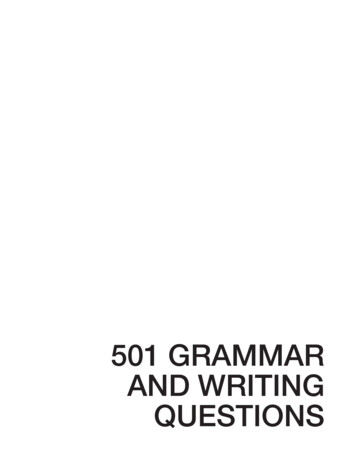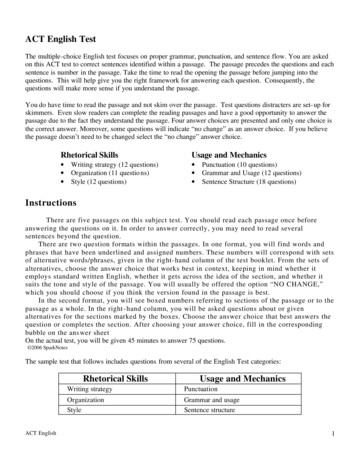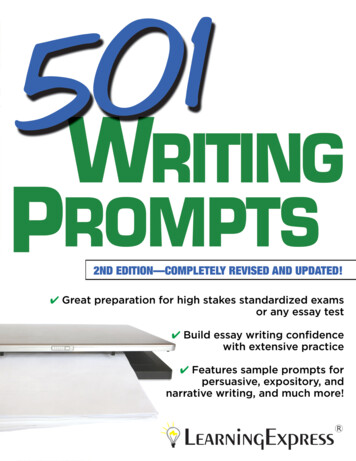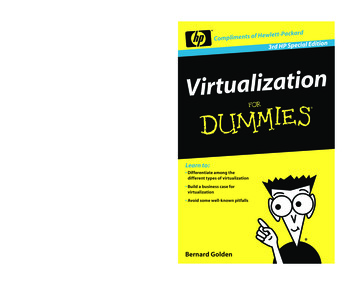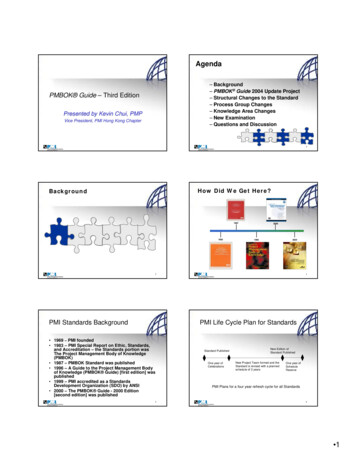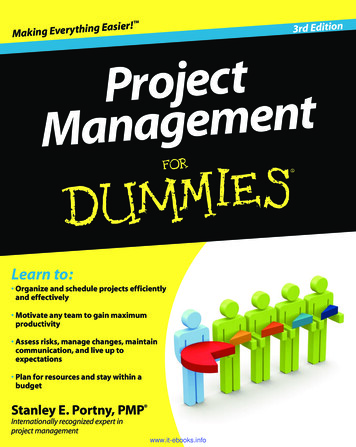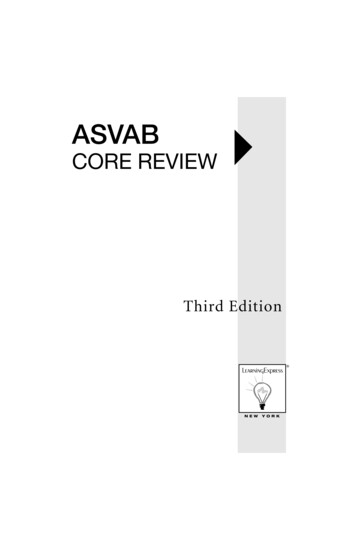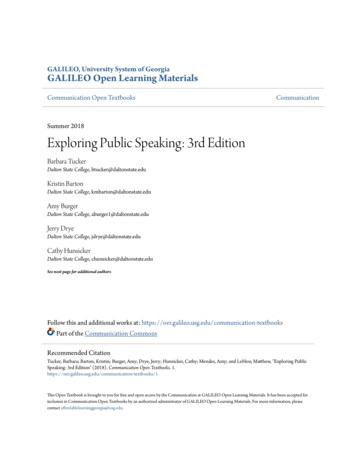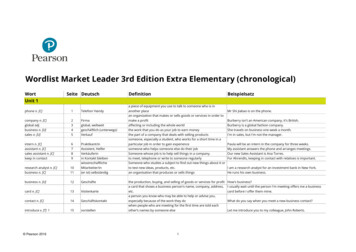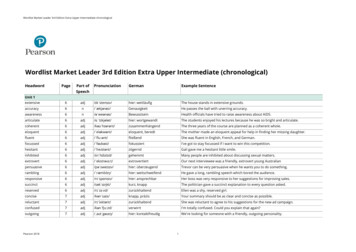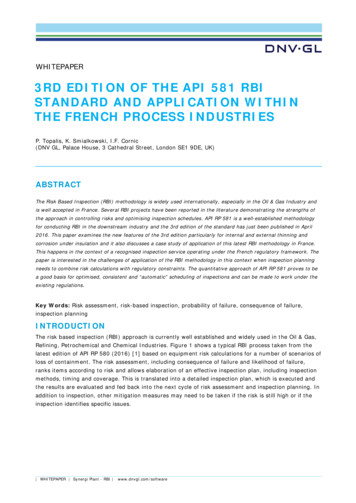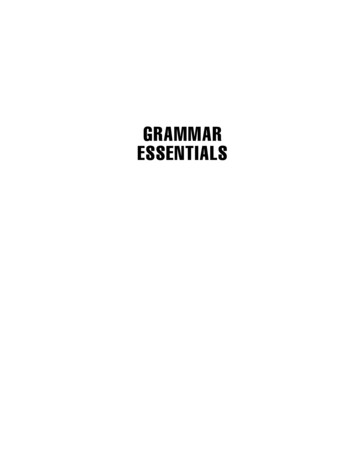
Transcription
GRAMMARESSENTIALS
GRAMMARESSENTIALSThird Edition NEW YORK
Copyright 2006 Learning Express, LLC.All rights reserved under International and Pan-American Copyright Conventions.Published in the United States by LearningExpress, LLC, New York.Library of Congress Cataloging-in-Publication DataGrammar essentials—3rd ed.p. cm.Rev. ed. of: Grammar essentials / Judith F. Olson, 2nd ed. c2000.ISBN 1-57685-541-41. English language—Grammar—Handbooks, manuals, etc.I. LearningExpress (Organization) II. Title.PE1112.O43 2006428.2—dc222006000600Printed in the United States of America9 8 7 6 5 4 3 2 1Third EditionFor information on LearningExpress, other LearningExpress products, or bulksales, please call or write to us at:LearningExpress55 Broadway8th FloorNew York, NY 10006Or visit us at:www.learnatest.com
CONTENTSIntroduction: How to Use This Book1 The Right Way to Writevii12 What Is a Sentence, Anyway?113 Filling Out Sentence Fragments174 Putting a Stop to Going On and On255 Good Beginnings, Good Endings376 Comma Sense497 More Jobs for Commas578 Getting Fancy with Semicolons and Colons679 Controlling Quotation Marks7510 The Mysteries of Apostrophes and Dashes8311 The Finer Points of Punctuation9112 Verbs That Follow the Rules9913 Rebellious Verbs10914 Don’t Be Tense about Verbs11915 Making Subjects and Verbs Agree12716 Beating the Pronoun Odds13917 Problem Verbs and Pronouns14918 Modifier Etiquette15919 Tricky Words17120 More Tricky Words183Conclusion191Grammar IQ Final Exam and Answers193Appendix A: Two-Word Verbs203Appendix B: Additional Resources207v
INTRODUCTIONHow to Use This Bookriting is a lot like playing the piano. SomeWpeople enjoy it more than others, and people who are good at it studyand practice it. No one is born playing the piano, but anyone can do it if he or shewants. The same goes for writing. If you’re interested in learning about writing andin becoming a better writer, this book will help you demystify and acquire the coveted power of the pen.This book covers the basics of writing: punctuation, usage, and diction.There’s no fluff here; this book is for busy people who want to learn as much asthey can as efficiently as possible. In 20 chapters, each of which you can completein 20 minutes, you can improve your grasp of grammar. Each chapter contains aGrammar IQ Quiz, lots of examples that illustrate the grammatical rules, andplenty of opportunities for you to practice the skills.vii
INTRODUCTIONMany people are afraid of writing. They look at a blank sheet of paper or anempty computer screen and say, “I just don’t know what to write. Even when Iknow what I want to say, I’m afraid it will come out looking wrong and sounding stupid.”But writing has three distinct advantages over speaking.1. You can take it back. Although writing is not instant communication andit doesn’t allow for immediate response and exchange, written communication can be retracted. Once words are spoken, you can never unspeakthem. However, writing can be revised until you’ve written the exactwords in the exact tone you want. It’s a more careful, thoughtful way ofcommunicating.2. You can make it clear. The second advantage is that writing forces you toclarify your thoughts. If you’re having trouble writing, it’s usually becauseyou’re not yet finished with the thinking part. Sometimes, just sitting downand writing whatever is on your mind helps you discover and organize whatyou think.3. It lasts. Another advantage is permanence. Ideas presented in writing carryfar more weight than spoken ideas. Additionally, these ideas can be reviewedand referred to in their exact, original form. Spoken ideas rely upon thesometimes inaccurate memories of other people.Writing is nothing more than carefully considered thoughts on paper. Manygreat ideas and observations are never born because their creators don’t expressthem. You may have some wonderful concepts inside your head with no way toget them out where others can see them. This book can help you express your ideas.Develop your own plan for completing the 20 chapters in this book. They’redesigned to be completed in 20 minutes a day, but you may want to take more orless time with each lesson—or more time with chapters you find difficult and lesswith those you know cold. You could do a chapter each weekday and come out witha better knowledge of grammar in only a month. Or you may want to do more orfewer chapters at a time. You should, however, plan to complete at least two chapters a week. If you leave too much time between lessons, you’ll forget what you’velearned.By the time you finish this book, you’ll have much more confidence in yourwriting, and you’ll probably be a better thinker. If you practice what you’velearned, it won’t take long for other people to notice the new and improved you.viii
GRAMMARESSENTIALS
CHAPTER 1 GRAMMAR IQ QUIZWhich of the following sentences would be more appropriate in a business communication?The answers and explanations follow the quiz.1a. Josh is wishy-washy.1b. Josh is indecisive.2a. It was agreed upon by the editorial department that Maria would lead all meetings with the design team for the purpose of avoiding a “too many cooks spoilthe broth” situation.2b. In order to avoid confusion, the editorial department delegated Maria to lead allmeetings with the design team.3a. Your supervisor informed the CEO that you do not support the company'sspending plans for the upcoming fiscal year.3b. The CEO has been informed by your supervisor that you are not on board withthe spending plans that have been made for the company's upcoming fiscal year.4a. It has been discussed at great length by the board members that vacation time beincreased from two weeks to three for employees who have been with the company for three years.4b. The board members have seriously discussed increasing vacation time from twoweeks to three for employees who have been with the company for three years.5a. We have been referring to this policy.5b. This is the policy to which we have been referring.Answers1b. is the better choice because the language is less colloquial.2b. is the better choice because it is written in the active voice, and is less wordy and colloquial.3a. is the better choice because it is written in the active voice, is less wordy, and containsno colloquialisms.4b. is a better choice because it states the idea more clearly using fewer words, and usesthe active voice.5a. is a better choice because it is not wordy.
CHAPTER1THE RIGHT WAYTO WRITESometimes, the words we use when we speak aren’teffective when we use them in writing. This chapterdiscusses the difference between spoken and writtenEnglish, informal language, wordiness, and preciselanguage.Grammar concepts to know: colloquial [ka LOW kwee ‘l], colloquialism [kaLOW kwee ‘l izm]—an informal word or phraseused in conversation, but not appropriate for business communication or other formal writing active voice—a sentence in which the subject(underlined) is performing the action of the verb(John read the letter.) passive voice—a sentence in which the subject(underlined) receives the action of the verb (Theletter was read by John.)ritten language makes a permanent impres-Wsion, one that can’t be changed by rephrasing the words the way you canin a conversation. That’s why it’s important to think carefully before you write. Takea look at the note on the following page. What kind of an impression will it make?1
GRAMMAR ESSENTIALSManny,Got your note today. Thought I’d get right back to you. Keep you fromgetting in a tizzy about this whole moving thing. It’s still kinda early topack stuff for the move cause the new building isn’t even done yet.Might as well wait til it is.Seems like Jack has been chosen by the top dogs to head up theentire moving process with all its various aspects. Due to the fact thathe hasn’t started doing a thing yet, there’s no sense in the rest of usgetting panicky about it. Don’t freak out; it’ll get done.J.C.SPOKEN ENGLISH VERSUS WRITTEN ENGLISHMany of the speaking patterns we use are not suitable in business writing. Forexample, if you listen to a conversation, you might hear incomplete sentences, sudden subject changes, or abbreviated versions of words and phrases. Althoughthese expressions are common in casual conversation, they are confusing and inappropriate when you are writing to a customer, supervisor, or employer. Avoid thesethings in written communication.Incomplete SentencesQuite often, we use fragments when we speak. We count on our tone of voice andour expression or the reaction of the listener to fill in the spaces. In writing, thisisn’t possible, so it’s important to write complete sentences that express completethoughts. See Chapter 3 to learn how to avoid sentence fragments.Sudden Subject ChangesIn everyday conversation, we switch subjects easily. Two speakers can exchange farmore information in two minutes than a reader can absorb in the same timeperiod. That’s why it’s important to use the reader’s time efficiently. Switching subjects requires time and mental energy. Write everything you have to say about onesubject before moving on to the next. Link subjects together to make it easier fora reader to go from one idea to another. See Chapter 15 on making subjects agreewith verbs.2
THE RIGHT WAY TO WRITEAbbreviated WordsMany words we use in conversation are not used when we write. Following is a listof words frequently used in speech; however, the written versions are different.Spoken VersionWritten Versioncause, becausecould havegoing tohave tokind ofshould havesort ofuntilwant towould haveSymbols instead of WordsDon’t use symbols in place of words, even if it seems simpler or more efficient.Write out the complete word in any written communication if you want to betaken seriously.four (not 4)to, too, two (not 2)and (not &)extra (not x-tra)COLLOQUIALISMS [ka LOW kwee ‘I izmz]Colloquialisms are informal words and phrases such as in a bind, pulled it off, realgood, etc. These words and phrases are widely used in conversations betweenfriends, but in business writing, they portray an attitude of familiarity that maycause your message to be taken less seriously than you intended or even insult yourreader. A friendly, colloquial tone is fine in a personal letter; however, a more formal tone is better for business communication. Compare the following paragraphs. If you received these two memos from your employees, which would youtake more seriously?We’re really in a bind on our end. Seems like every time we turnaround something else comes up. Today was one of those days. A few3
GRAMMAR ESSENTIALSof the guys who decided to live it up last night couldn’t get over it thismorning. Since we were shorthanded, we didn’t come close to ourdaily quota. This is really ticking me off.We’re having trouble meeting our quota as new problems keep arising.Today was a difficult day because several employees who stayed out latelast night were unable to make it to work on time. Because we wereshorthanded, we missed our quota. This is extremely upsetting.The following sets of sentences illustrate the difference between colloquialand standard diction. The colloquial sentences in the first column are rewrittenin the second column using more standard language.ColloquialStandardThe car works real good.Ben got sick of waiting.I’m awful thirsty.The car works well.Ben tired of waiting.I’m very (or quite or extremely)thirsty.It looks as if (or as though) they’llbe late.The cake was very (or quite) good.We’re in trouble.Drew postponed it until tomorrow.I don’t have a very good chance.Rosa arrived in time.Jill received the order.I like to spend time with her.Kip conveyed the wrong idea.I just don’t understand.Why are you leaving?Why?I understand your point.Leah had a difficult day.Rodney can’t decide.Robin will watch things.They’re going to celebrate tonight.The Knicks succeeded.It looks like they’ll be late.The cake was real good.We’re in a bind.Drew put it off till tomorrow.I don’t have that much of a chance.Rosa got there in time.Jill got the order.I like to pal around with her.Kip got the wrong idea across.I just don’t get it.How come you’re leaving?What for?I see where you’re coming from.Leah had one of those days.Rodney can’t make up his mind.Robin will keep an eye on things.They’re going to live it up tonight.The Knicks pulled it off.4
THE RIGHT WAY TO WRITEWORDINESSNot only do extra words waste space and time, but they may also distort the message or make it difficult to understand. Get in the habit of streamlining your writing, making your sentences as concise as possible. If you use five words where threewould do, delete the extra words or structure your sentences to avoid them. Readthe following examples.Wordy: It was a twenty-minute period of time after the accident hadoccurred when the emergency vehicles arrived to lend assistance.[21 words]Revised: The emergency vehicles arrived twenty minutes after theaccident. [9 words]Wordy: It was decided that the club would organize a committeefor the purpose of conducting a search for a new chairperson.[21 words]Revised: The club organized a committee to search for a new chairperson. [11 words]The additional words add no information. All they do is take up space.Buzzwords and FluffBuzzwords are words that sound important but don’t add much meaning towriting. They include words such as aspect, element, factor, scope, situation, type,kind, and forms. Fluff words such as absolutely, definitely, really, very, important, significant, current, major, quite, etc., also may add length to a sentence, but like buzzwords, they seldom add meaning.Wordy: The nature of the scheduling system is a very importantmatter that can definitely have a really significant impact on themorale aspect of an employee’s attitude. Aspects of our currentscheduling policy make it absolutely necessary that we undergo a sign
05.03.2006 · Grammar IQ Quiz, lots of examples that illustrate the grammatical rules, and plenty of opportunities for you to practice the skills. INTRODUCTION viii Many people are afraid of writing.They look at a blank sheet of paper or an empty computer screen and say, “I just don’t know what to write. Even when I know what I want to say, I’m afraid it will come out looking wrong and sound-ing .
